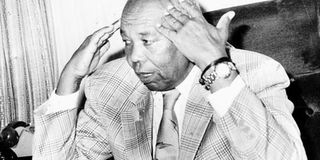John Keen: Reporter who became political giant

Politician John Keen in February, 1990. PHOTO | FILE
What you need to know:
In 1967, veteran journalist and former publisher of the Weekly Review, Hillary Ng’weno, tells us, Keen was the first politician to be detained by President Jomo Kenyatta.
He thought President Kenyatta, Tanzania’s Julius Nyerere and Dr Milton Obote of Uganda were paying lip service to East African unity and told them as much – and paid for it.
Death is cruel as to sting a family on, of all occasions, Christmas Day. But, the greatness of some men and women is such that their lives defy convention even in the terminal matters of death.
One-time Taifa Leo reporter John Keen was such a man. An ebullient, bold, straight-shooting spirit, Keen wasn’t the type to leave this world on your normal, boring day.
In 1967, veteran journalist and former publisher of the Weekly Review, Hillary Ng’weno, tells us, Keen was the first politician to be detained by President Jomo Kenyatta. He thought President Kenyatta, Tanzania’s Julius Nyerere and Dr Milton Obote of Uganda were paying lip service to East African unity and told them as much – and paid for it.
“Nililikuwa mkorofi na Kenyatta akanitia ndani (I was antagonistic and Kenyatta put me in prison),” he told me at his Re-insurance Plaza shop-cum-office in the advent of the 1997 elections.
As a KNA reporter in the late 1980s and early ’90s, I quickly learnt that Keen was a favourite with the masses for not pulling his punches.
He had lost the Kajiado North parliamentary seat to Philip Odupoy in 1983 but President Daniel arap Moi would later nominate him to Parliament and make him an assistant minister – in the Office of the President, no less. The idea was to keep the troublesome politician on a short leash and away from destabilising Prof George Saitoti, who had replaced Odupoy in Parliament and would later be Moi’s Vice-President.
But you could only contain Keen for some time. A wealthy landowner in the upscale Karen, Kilifi and Namanga, he was not beholden to Kanu’s patron-and-clientele politics. Come 1992 and he was firmly in the opposition. Before forming the Democratic Party (DP) with former President Mwai Kibaki and Njenga Karume, Keen would spare Prof Saitoti his barbs, but not the rest of the Kajiado pack. Once he was in the opposition, Prof Saitoti was fair game.
GERMAN BLOOD
At a campaign rally in Loitokitok in 1992, Keen openly spoke about his German blood and challenged “one Kinuthia” to declare his ethnicity. That Kinuthia happened to be Prof Saitoti, who had deliberately kept his ethnicity close to his chest.
Keen’s DP friends were not spared his wrath either. He once bizarrely sued Mr Kibaki over a Sh1 million debt but the matter was settled after Karume told the two DP gentlemen to behave themselves.
In a loud, guttural voice he would demolish an opponent – to the chagrin of the polished mathematics professor.
As a reporter, you develop a fondness for the politician who supplies juicy quotes, and juicy ones Keen did supply. Many are the times when Prof Saitoti would beckon me to his seat and ask me to water down Keen’s acidic sentiments. On one such occasion, Keen had called Kenneth Matiba and Charles Rubia names for dumping Kanu. Contrary to expectation, Prof Saitoti asked me to “moderate” Keen’s sharp tongue, which I didn’t. But more was in store for me.
At the end of the rally in Ongata Rongai, Keen asked me to ignore his sentiments altogether for they were meant for the ears of “these Kanu people and the Special Branch”. Mainly a Moi-era political police wing, Special Branch was the predecessor of the National Intelligence Service.
Of course I ignored the politicians and reported accurately. A week later, Prof Saitoti’s PA told me: “Mzee is not amused.” But Keen commended me for sticking to my story. “You know, I’m a journalist,” he joked.
Years after leaving KNA, fellow journalist Kamau Ngotho and I were interviewing Keen about a Maasai rebellion against President Moi in 1997 that was led by William ole Ntimama and he was all for it.
Suddenly, the phone rang. After an exchange of pleasantries in Maa, the man thundered: “Tell him I’m not coming over. Mimi sio mtoto (I’m not a child). Tell him so!” and disconnected the line.
A MESSAGE
The man on other end of the line, he told us, was Cabinet Minister Julius ole Sunkuli, delivering a message from President Moi. The State House invitation was in the context of cutting Ntimama to size.
Senior citizens in Kajiado miss Keen’s epic supremacy wars with a giant of a politician called Stanley ole Oloitiptip, a Moi ally. When I asked Keen about those days, nostalgia was written all over his face as he said: “These days the game is boring. No fireworks.”
Oloitiptip would die at a witchdoctor’s shack in Loitokitok while undergoing treatment after being associated with Charles Njonjo, a former Attorney-General and later Minister for Constitutional Affairs. That was after a stretch at Athi River GK Prison after being convicted on trumped-up charges of running a seedy eating house in Loitokitok which the prosecutor described as a hotel, without a trading licence. Kanu politicians branded him a “traitor” out to overthrow President Moi.
For the 10 years he was the Kajiado North MP, Keen held very few harambees. I once asked Mr Keen why he barely donated more than Sh5,000, whereupon he told me he believed governments existed to provide basic services because they collected taxes and if people were daft enough not to support their representatives in the push for such services, too bad for them.
When Frank Sinatra sang “I travelled each and every highway; And more, much more than this, I did my way” that bold existentialist statement might as well have been Keen’s.





